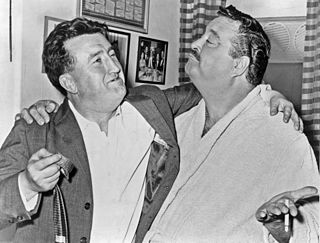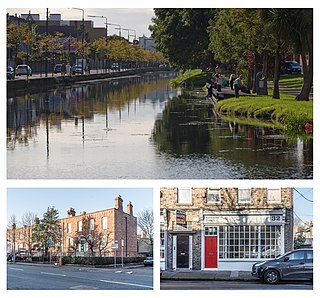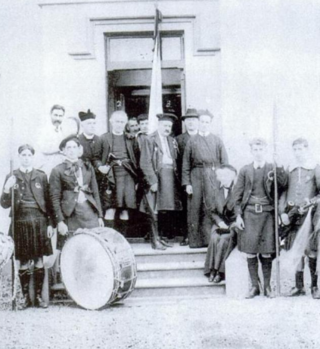
Brendan Francis Aidan Behan was an Irish poet, short story writer, novelist, playwright, and Irish Republican, an activist who wrote in both English and Irish. His widely acknowledged alcohol dependence, despite attempts to treat it, it impacted his creative capacities and contributed to health and social problems which curtailed his artistic output and finally his life. In 2023 reports emerged of his allegedly sexually violent behaviour against a young New York publicist, Letty Cottin Pogrebin in the early 1960s.

Castlerea is the third largest town in County Roscommon, Ireland. It is located in the west of the county and had a population of 1,992 at the 2016 census. Roughly translated from Irish, Castlerea is generally thought to mean 'brindled castle'. An alternative translation is 'castle of the king'. The town is built on the banks of the River Suck and the River Francis, both of which are tributaries of the River Shannon.
Events from the year 1934 in Ireland.

Portobello is an area of Dublin in Ireland, within the southern city centre and bounded to the south by the Grand Canal. It came into existence as a small suburb south of the city in the 18th century, centred on Richmond Street.
Timothy Brendan Kennelly, usually known as Brendan Kennelly, was an Irish poet and novelist. He was Professor of Modern Literature at Trinity College Dublin until 2005. Following his retirement he was a Professor Emeritus at Trinity College.

Captain Robert Laurence Nairac was a British Army officer in the Grenadier Guards who was abducted from a pub in Dromintee, south County Armagh, during an undercover operation and killed by the Provisional Irish Republican Army (IRA) on his fourth tour of duty in Northern Ireland as a Military Intelligence Liaison Officer.
Sir Brian O'Rourke was first king and then lord of West Breifne in Ireland from 1566 until his execution in 1591. He reigned during the later stages of the Tudor conquest of Ireland and his rule was marked by English encroachments on his lands. Despite being knighted by the English in 1585, he would later be proclaimed a rebel and forced to flee his kingdom in 1590. He travelled to Scotland in early 1591 seeking assistance from King James VI, however, he was to become the first man extradited within Britain on allegations of crimes committed in Ireland and was sentenced to death in London in November 1591.

7 Days was an Irish current affairs television programme presented by Brian Farrell, Brian Cleeve, and John O'Donoghue which was broadcast on RTÉ One from 1966 until 1976.

Brian Brendon Talbot Cleeve was a writer, whose published works include twenty-one novels and over a hundred short stories. He was also an award-winning broadcaster on RTÉ television. Son of an Irish father and English mother, he was born and raised in England. He lived in South Africa during the early years of National Party rule and was expelled from the country because of his opposition to apartheid. In his early thirties he moved to Ireland where he lived for the remainder of his life. In late middle age he underwent a profound spiritual experience, which led him to embrace mysticism. He developed a model for the spiritual life based on the principle of obedience to the will of God.

Sir Richard Bingham was an English soldier and naval commander. He served under Queen Elizabeth I during the Tudor conquest of Ireland and was appointed governor of Connacht.

Tread Softly in this Place is a novel set in the town of Ross, located in a remote part of rural Ireland, and written over the course of 1970/71 by the Irish-based author, Brian Cleeve. The narrative takes place over four days and charts the interconnecting lives and loves of a disparate collection of characters. Tread Softly in this Place is a further exploration of Irish themes following Cleeve's successful Cry of Morning, although it did not sell as well as the latter.
Ernest Gébler, sometimes credited as Ernie Gebler, was an Irish writer of Czech origin. He was a member of Aosdána.

George Oliver Plunkett, known to his contemporaries as Seoirse Plunkett, was a militant Irish republican. He was sentenced to death with his elder brother Joseph Plunkett and his younger brother John after the 1916 Easter Rising, but while Joseph was executed, George's and John's sentences were commuted. He was released in 1917, fought in the Irish War of Independence and Irish Civil War, and was briefly IRA Chief of Staff during World War II.
The Auditor of the Literary and Historical Society at University College Dublin, Ireland is a position elected by the members of the society. In this setting, the term auditor has no connection with accounting but means "a position corresponding to that of President of the Union at Oxford or Cambridge". Some former auditors of the society have gone on to careers of high distinction in law, politics, medicine, academia, journalism, and other endeavours.

Grangegorman is an inner suburb on the northside of Dublin city, Ireland. The area is administered by Dublin City Council. It was best known for decades as the location of St Brendan's Hospital, which was the main psychiatric hospital serving the greater Dublin region. As of 2020, the area is the subject of a major redevelopment plan, running for more than a decade, under the aegis of the Grangegorman Development Agency, including the new Technological University Dublin campus.

Francis Joseph Bigger was an Irish antiquarian, revivalist, solicitor, architect, author, editor, Member of the Royal Irish Academy, and Fellow of the Royal Society of Antiquaries of Ireland. His collected library, now distributed across several public institutions, comprised more than 18,000 books, journals, letters, photographs, sketches, maps, and other materials. His house in Belfast was a gathering place for Irish nationalist politicians, artists, scholars, and others. He was a prolific sponsor and promoter of Gaelic culture, authored many works of his own, founded several institutions, and revived and edited the Ulster Journal of Archaeology.

Eccles Street is a street in Dublin, Ireland.












